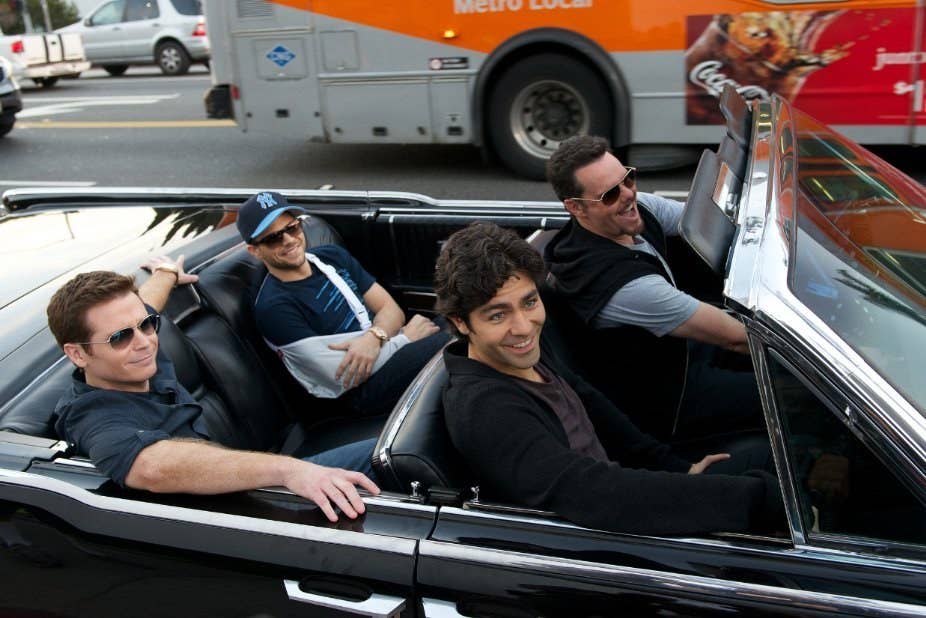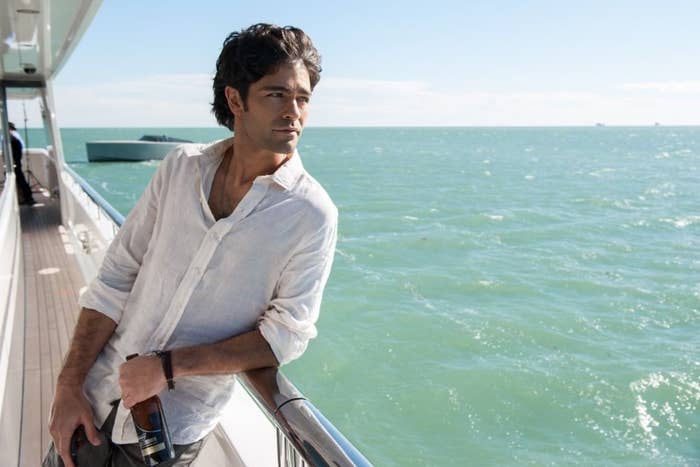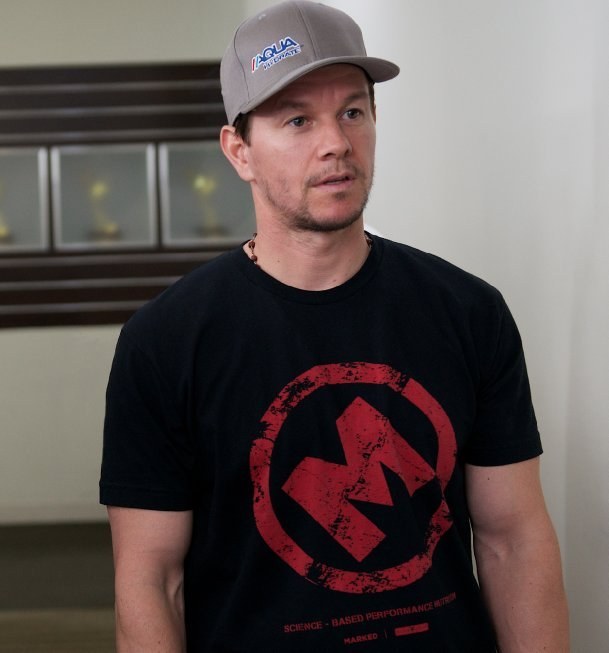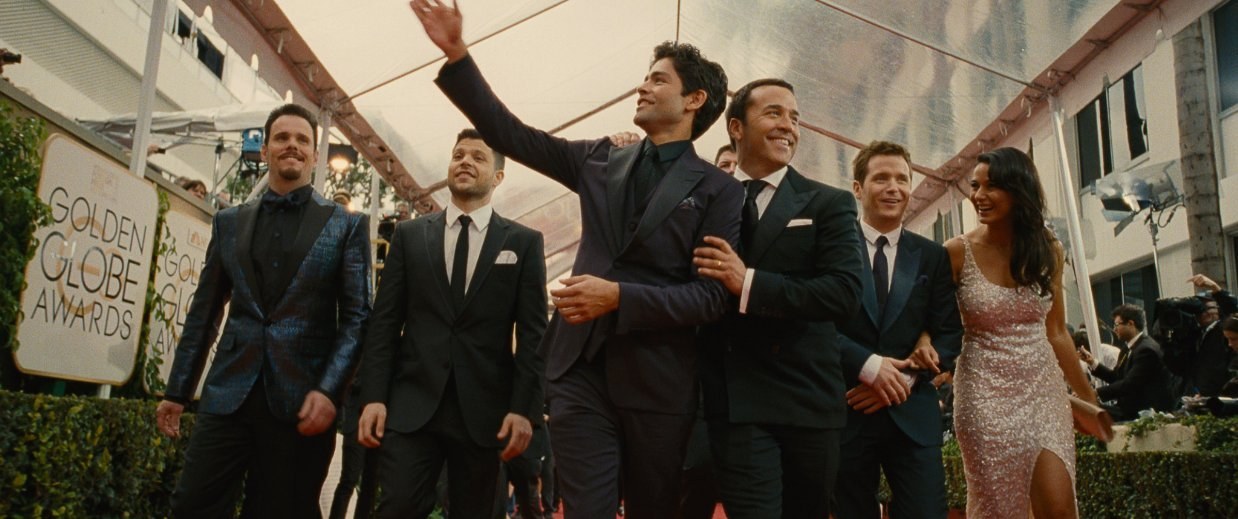
The Entourage movie starts with what's basically a straight-faced version of the opening to Austin Powers: The Spy Who Shagged Me. In the beginning of the spy spoof sequel, a honeymooning Austin Powers (Mike Myers) discovers that his love interest from the first film, Vanessa (Elizabeth Hurley), is actually a killer robot. "I can't believe Vanessa, my bride, my one true love, the woman who taught me the beauty of monogamy, was a fembot all along," he mourns. Then, after a beat, he's over it. "Wait a tick. That means I'm single again! Oh, behave!" And off he dances into the opening credits.
Vincent Chase (Adrian Grenier), the movie star to whom the entourage of the title is hitched, got married at the end of the HBO series in 2011. Entourage The Film, written and directed by show creator Doug Ellin, picks up just nine days later, and disposes of the love interest Vince committed his life to with Powers-worthy briskness. Well, at least Powers spent a second looking sad — Vince is totally unfazed by the off-screen end of his romance. He and his new bride realized they didn't have a thing to say to one another, he explains, and so they decided, at her suggestion, to annul the marriage. Then they agreed to stay friends, and parted ways... though, naturally, not before having sex one last time.

Vince's retelling of these events is offered up on a yacht, filled with gyrating, bikini-clad women who Vince's friends have just boarded in order to join him in celebration of his return to bachelorhood. "I may have to jerk it before I even get there," Johnny Drama (Kevin Dillon) notes before arriving, marking Entourage's first line. Single again, and no behaving necessary — the boys are back, like it or not.
"Or not" is probably the answer, unless you're one of the Entourage diehards who managed to weather the show's decline from witty insider comedy to self-congratulatory fantasy over the course of its eight seasons. While most big screen continuations of television series aim to be grander and more ambitious than the average episode, Entourage feels no such obligations. The movie is maybe 30 minutes of plot diluted to feature length, padded with extra celebrity cameos (the best of which are from Armie Hammer and Liam Neeson) and some footage taken at the Golden Globes earlier this year.
It is ridiculously, maddeningly short on conflict, a slack hour-and-a-half story about how the awesome lives of its five main characters get even awesomer. It treats women interchangeably like fleshlights or jiggly decor. And it treats the public like morons. If it has a point to make at all, it's about how some nepotism is good, and other nepotism is bad, mostly when it doesn't directly involve you and your friends.
But Entourage is the movie about Hollywood we deserve — one that's breathtakingly honest about how great the industry is if you're a rich white dude, and how terrible and unwelcoming it is for almost everyone else. It's unflinchingly unapologetic about that fact. At a time when there's increasing awareness about how difficult a time female filmmakers have getting hired to make studio movies compared to men with similar or less experience, Entourage is built around Vince effortlessly navigating himself into a $100 million tentpole for his directorial debut on an apparent whim. It's called Hyde, and it's a miserable franchise-launching cyberpunk take on Strange Case of Dr Jekyll and Mr Hyde, starring Vince as a futuristic DJ. The footage we see looks like a spoof of your typical gritty, overly serious blockbuster reimagining. The suspense hinges on whether it'll be a box office hit, or a box office hit and an awards contender.
Is Hyde supposed to be a good picture? Is Vince supposed to be a good actor? These questions are unanswerable, and also beside the point in the soul-dead world in which Entourage is set. Vince is popular, a hot commodity, and so, hopefully, is his movie, which his apoplectic former agent Ari (Jeremy Piven) bankrolled as his first title in his new gig as a studio exec.

Everything is a product in Entourage, so much so that even the characters have trouble separating out what they think is marketable from what they actually want. When Turtle (Jerry Ferrara) tries to pursue his crush (MMA fighter turned actor Ronda Rousey, playing herself), he muddles his romantic intentions with various business propositions involving her personal brand until she gets frustrated and tosses him out. The film's most emblematic moment is when Mark Wahlberg, whose real life entourage inspired the series, shows up as himself, in the middle of the movie he's produced, in order to plug his reality show Wahlburgers on A&E.
Or maybe it's the moment when Jessica Alba stalks out of a sound stage to take Ari to task for not yet greenlighting her passion project, pointing out that the director of the zombie apocalypse movie she's doing has been Instagramming her ass in exchange. Vince's attractiveness helped elevate him to A-list status, but Entourage makes clear that the deal is different for women. It reduces them, famous and otherwise, into body parts, but also matter of factly depicts how they've internalized and become inured to doing this to themselves. Their being there has required them to surrender to certain standards.
When Ari calls and interrupts Eric (Kevin Connolly) in bed one morning, he asks if the girl Eric's with has "big tits" or a "tight ass." The girl, who can hear him, sniffs that she has both. And when asked about getting photographed, Emily Ratajkowski says, "I know what I look like," with no apparent feeling one way or another. The model turned "Blurred Lines" video dancer turned Gone Girl actor plays herself and Vince's love interest, though she's just as much a prize to be fought over by Vince and Travis McCredle (Haley Joel Osment), the troublesome son of the Texas investor (Billy Bob Thornton) who's put up a lot of the money behind Hyde.

It's a battle Vince doesn't even realize he's fighting, so effortlessly has he won. It is, as Ari puts it, what movie stars are supposed to do — get the girl as well as everything they want, without even having to try. Being a rich white guy is nice, but being a rich, handsome, famous white guy is better. Entourage's minor dramas are mostly about its men trying to out-posture each other — there's Travis trying to outmaneuver an oblivious Vince, or Ari summoning someone down to the office he's running to get to as a power play, or getting summoned himself to Amarillo ("Do you know what they do to Jews in Texas?" he asks).
These are silly games, but they're exclusive ones worth millions of dollars, and Entourage is insistent that only a very small group of people get to play. And if you're not one of them, the next best thing is having a friend who is and who'll take care of his own. Entourage long ago left behind the idea of being about a regular group of guys soaking up the insanity of Hollywood and about the genuine ties between them. Now it's just a glorification of being one of the winners, reveling in the industry's absence of meritocracy and shrugging at everyone left floundering on the outside because of their lack of power or powerful pals. Whether Entourage is escapist or crushingly depressing depends on what part of that imbalanced set up you see yourself, but its celebratory guest list is awfully exclusive.
